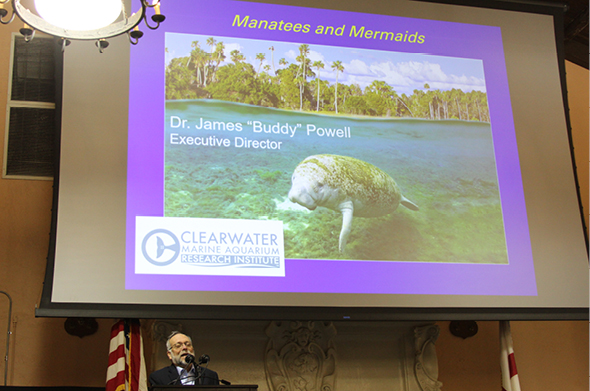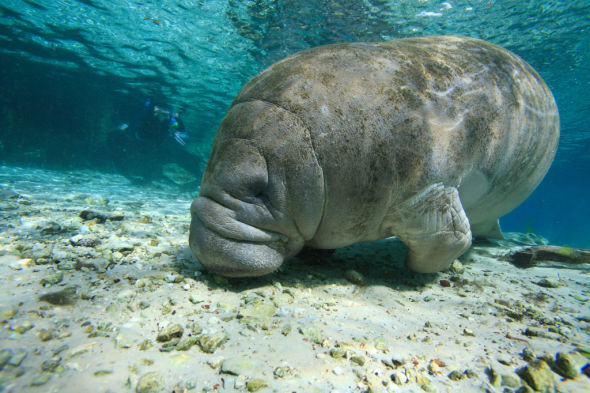Clearwater Aquarium’s Buddy Powell on Manatees & Mermaids

A majestic sight in Florida’s rivers and coastal waters, manatees are as beloved as they are emblematic of the Sunshine State. Yet the large aquatic mammals – who may have inspired the myth of mermaids – might be more threatened than ever in Florida and other places they dwell.
That’s why, for its first Foreman Biodiversity Lecture of 2023, Stetson Law hosted Dr. James “Buddy” Powell, one of the world’s leading experts on manatees, for a compelling talk about these lovable sea creatures and how to protect them.
President of Clearwater Marine Aquarium (CMA) and director of the facility’s Research Institute, Powell has contributed to humanity’s understanding of manatees, also known as sea cows, for decades.
From Cousteau to Clearwater
Powell’s interest in manatees dates back to the 1960s. Growing up in Crystal River, Florida, a waterfront town about 100 miles north of Stetson Law’s main campus in Gulfport, he spent extensive time navigating the pristine springs that feed the river, springs with 72-degree water year-round, which attracts manatees in search of warmth when Gulf and Atlantic temperatures plummet.
Jacques Cousteau himself hired Powell, then a high-school student, as a guide to find manatees in Crystal River.
He even has a near-photographic memory of manatees he has studied and can identify them by the unique scarring patterns on their thick skin, which are often caused by boat propellers.

A truly fascinating species
Powell spoke passionately about the Florida manatee and its counterparts around the globe, including the Amazonian manatee, the African manatee and the dugong – the manatee’s fork-tailed relative in the Indo-West Pacific.
Though they dwell in waterways, he said, manatees are more closely related to elephants than whales or dolphins. In addition to elephants, they share a common ancestor with aardvarks and hyraxes. Like elephants, they have an exceptional memory – which helps them maintain consistent food sources and get to warm-water sanctuaries when temperatures drop.
Also, they may have inspired maritime lore for cultures the world over. “No matter where you go – Africa, South America, Central America – there is this reference and legacy to a water deity like a mermaid,” Powell said.
An inspiration for future environmental lawyers
As law students, those present at the lecture were curious about how they can use their skills to help manatees thrive despite numerous factors depleting their habitat and food supply. Powell, who has advocated for protections for manatees and their habitats in Florida, West Africa, Central America, and Cuba, had some insights.
He recalled his early efforts to get protections in Citrus County, where Crystal River is located, in 1969. Time was of the essence, he said, given how development and other factors posed a threat to their habitat.
“We realized in time that it was a really special place,” he said.
Powell and other environmental advocates proposed that Crystal River become a manatee sanctuary. Officials initially denied the request, but ultimately came around – to everyone’s benefit; manatee-spotting is now a major tourism draw during the winter months.
“I can say ‘I told you so,’” he said.
A complicated threat
The U.S. Fish and Wildlife Service downlisted manatees from endangered to threatened in 2017. The designation comes as a mortality trend on the Atlantic Coast has led to record manatee deaths. Nutrient loading in the Indian River Lagoon – fertilizer, agricultural runoff, septic tank leakage – is feeding algae blooms that affect manatees’ main food source.
“What’s happening is, this algae has decreased the water clarity, which seagrass – being grass – needs clear water and light through to the bottom to grow,” Powell said. “Now, we’ve seen a dramatic decrease in vegetation. So they’re getting there and they’re finding, well, ‘where’s the buffet?’”
Environmental lawyers can help, he said, by using their legal expertise to push for science-backed clean water protections.
“It’s about environmental regulation and environmental laws – so that we can remove those threats to manatees,” Powell said. “What’s good for manatees is good for everything else.”
Post date: Feb. 20, 2023
Media contact: Kate Bradshaw
[email protected] | 727-430-1580